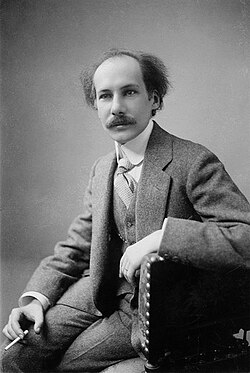
Back Andrei Beli Afrikaans أندريا بيليه Arabic اندريه بيلى ARZ Андрэй Белы Byelorussian Андрей Бели Bulgarian আন্দ্রে বেলি Bengali/Bangla Andrei Beli Catalan Andrej Bělyj Czech Andrei Bely German Αντρέι Μπέλιι Greek
Andrei Bely | |
|---|---|
 Bely in 1912 | |
| Born | Boris Nikolaevich Bugaev 26 October 1880 Moscow, Russian Empire |
| Died | 8 January 1934 (aged 53) Moscow, Russian SFSR, Soviet Union |
| Occupation |
|
| Alma mater | Imperial Moscow University (1903) |
| Period | 1900—1934 |
| Literary movement | |
| Notable works | The Silver Dove (1910) Petersburg (1913/1922) |
| Signature | |
Boris Nikolaevich Bugaev (Russian: Бори́с Никола́евич Буга́ев, IPA: [bɐˈrʲis nʲɪkɐˈlajɪvʲɪdʑ bʊˈɡajɪf] ⓘ; 26 October [O.S. 14 October] 1880 – 8 January 1934), better known by the pen name Andrei Bely or Biely,[a] was a Russian novelist, Symbolist poet, theorist and literary critic. He was a committed anthroposophist and follower of Rudolf Steiner.[1] His novel Petersburg (1913/1922) was regarded by Vladimir Nabokov as the third-greatest masterpiece of modernist literature.[2][3][4] The Andrei Bely Prize (Премия Андрея Белого), one of the most important prizes in Russian literature, was named after him. His poems were set to music and performed by Russian singer-songwriters.[5]
Cite error: There are <ref group=lower-alpha> tags or {{efn}} templates on this page, but the references will not show without a {{reflist|group=lower-alpha}} template or {{notelist}} template (see the help page).
- ^ Norwich, John Julius (1985–1993). Oxford illustrated encyclopedia. Judge, Harry George., Toyne, Anthony. Oxford [England]: Oxford University Press. p. 43. ISBN 0-19-869129-7. OCLC 11814265.
- ^ 1965, Nabokov's television interview TV-13 NY
- ^ Nabokov and the moment of truth on YouTube
- ^ Nabokov’s Recommendations (opinions on other writers)
- ^ Little theater on the planet of Earth, sound tracks of songs on poems by Andrei Bely, music and performance by Elena Frolova